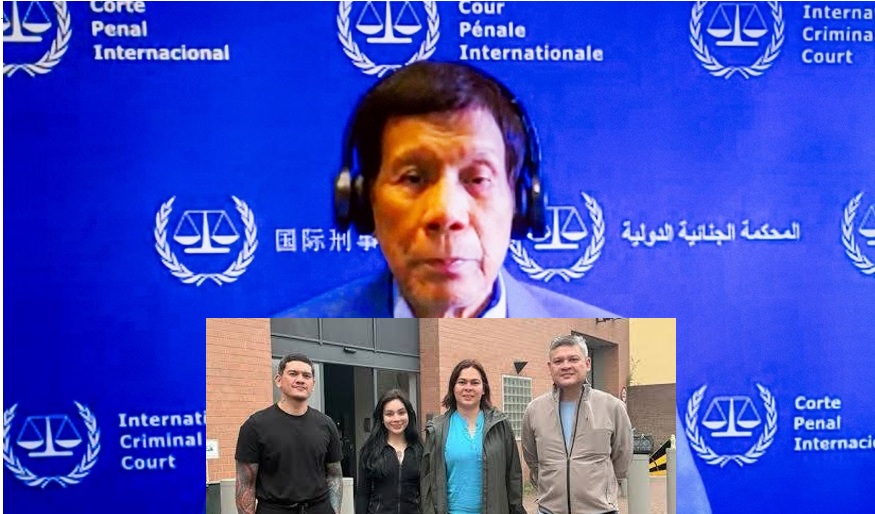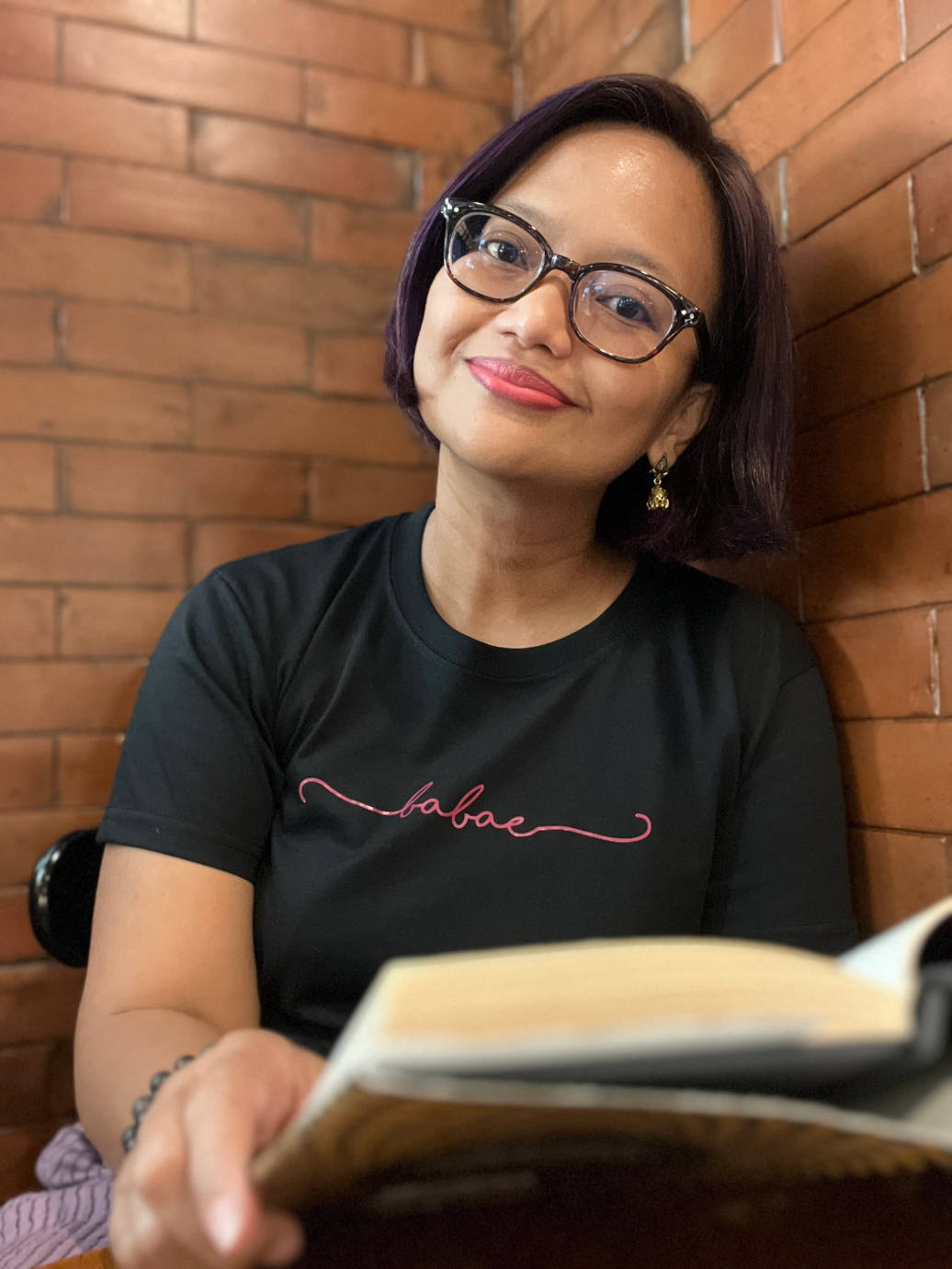There are many reasons to be entertained by the news that Rodrigo Duterte’s legal defense has decided to request that the International Criminal Court (ICC) “adjourn hearing indefinitely” because he is “not fit to stand trial.”
It is especially entertaining if one considers that for the past six months since his arrest, and since the family has been able to visit Duterte at the ICC Detention Center in the Hague, visiting family members have consistently stepped out to talk to the crowd, big and small, on what they call Duterte Street. And each and every time, they reassure this people: Duterte is okay.
If you’re on the Tiktok algorithm of the Dutertes, this is in fact what props it up. With the Vice President away from the Philippines most of the time, and her brothers not really worth any media coverage, what is here is massive content on Duterte based on updates from these family visits. And at no time did it seem like he has “cognitive impairment in multiple domains” that would make him unfit for anything at all.
During the June 2025 visits of Congressman Paolo Duterte, the image painted of the old man Duterte was of someone who has all his mental faculties together. According to Pulong, on June 16, Duterte had this message for his followers who were waiting outside the detention center: “Alagaan ang Pilipinas, alagaan ang mga Pilipino. Kaming mga pulitiko dadaan lang, ang importante bumuti ang Pilipinas during their time.” (Take care of the Philippines, take care of Filipinos. We politicians will be passing through, the important thing is to make sure the country become better during our time.)
And while both Pulong and his sister Vice President Sara Duterte would talk about how thin their father had become, the narrative was also consistent: thin, but okay.
In the same June 16 update, Pulong would say: “Ang laki ng pinayat. Pero okay naman siya, okay mag-storya, okay mag-joke, palaging nagpapatawa. Okay lang.” (He’s grown very thin. But he’s okay. He tells stories, makes jokes, always making us laugh. He’s okay.)
On July 2, Pulong’s daughter Sabina would give us an inkling of how well Duterte actually is. She speaks of telling her grandfather about the group of supporters outside of the detention center: “He’s okay, he’s actually really healthy. When we talk about you guys being here, he’s really really happy to know about it. and he also wants to express his thanks to everyone here right now.”
When Vice President Sara arrives at the Hague to take on visiting duties, she also speaks about the weight loss of her father, but not as a matter to be concerned about. “Para sa akin lang ha, he looks good na payat, kesa sa ‘yong malaki ang tiyan, parang unhealthy tingnan mukhang nakakatakot para sa kanyang heart. So I like him this way, medyo slim.” (For me, he looks good thin, instead of when he had a big stomach, and he looked unhealthy, and I feared for his heart. So I like him this way, kind of slim.)
The daughter also gives us a sense of his mental faculties, undecided as Duterte was about what to do with his hair. “’Di siya maka-decide kung mag-white hair siya, o magpa-tina. Minsan sa umaga pagtingin niya sa salamin, gusto niya mag-all-white. Minsan naman daw gusto niya magpa-tina. Nung Tuesday, nag-request siya ng haircut, at nasubmit na rin naming ang request for haircut. Nag-request na rin kami ng manicure and pedicure.”
Note that the context for the manicure-pedicure request was not that Duterte did not have the “mental faculties” to cut his own nails; it’s that he has never had to do so. So apparently, he didn’t know how to cut his own nails, and on one of her earlier visits, the daughter had to cut it for her father. This is in line as well with the narrative of how Duterte didn’t know how to prepare his own food, or wash his own clothes—things that have nothing to do with his capabilities but with the kind of service others did for him all his life.
The visits of youngest daughter Veronica, during her August to September visitor shift, are also a measure of Duterte’s mental and cognitive sense.
On August 12, Kitty said that her father realized that he was aging but still kept his strong persona together. On August 14, she talked about bringing him his favorite snacks (“Doritos, caramel waffles, Coke Zero and Gatorade”), and how Duterte tends to lie about his activities in the detention center: “Ito kasi siya minsan ayaw magsabi ng totoo. (Sometimes he doesn’t want to tell the truth.) So I asked the guards. He does walk around sometimes, he watches different series sometimes, he reads sometimes.”
On that same day, Duterte had another message for his followers outside of the detention center: “Ang sabi niya do not worry about him daw, kasi sanay siya eh sanay siya to adapt to what life brings, sanay siya to deal with the cards that he’s been given.” (He said don’t worry about him, because he’s used to adapt to what life brings, he’s used to dealing with the cards that he’s been given.)
On August 16, Kitty and her father even have a conversation about the flood control projects and corruption controversies, and Duterte had the sense to ask if that was a problem at all when he was president, to which the daughter of course said it was not. “Ang sabi ko no, you were a good one, you were an excellent one, so ayun tumawa lang siya (so he laughed) and then he quickly shifted na to family matters.”
On August 18, another message from Duterte through Kitty: “no regrets and no apologies, he did what is good for the country.”
On August 19, Kitty talks about her conversation with her father, proving his cognitive faculties. “’Coz my father, he’s a big believer in fate and destiny, and he said verbatim that ‘it is written.’ You know what, it is written sa buhay, kung anong nasa palad mo, hindi mo ‘yan matatakasan, (You know what, life is written, whatever’s in your palm, you cannot escape it,) so you just pray to God that he doesn’t give you a harsh experience in life.)
On August 21, Duterte received both his daughters, Kitty and Sara, during which visit it was “lively and cheerful” and Duterte was “back to his humorous self.”
On August 23, Duterte had the sense to make a request that his four children be allowed to visit him altogether.
Across the visits towards the end of August, it would be Baste Duterte giving updates, painting a picture of their father as someone who remained interested in the goings-on in Davao City (August 26) and the Philippines in general, with conversations about the 2025 elections and even asking about Sara’s plans for 2028 (August 27): “Tapos nagtatanong siya sa 2028 kung kumusta yung kapatid ko, tatakbo raw ba, sabi ko depende, sabi ko it’s better kung yung kapatid ko ang sumagot sa tanong niya.” (And then he was asking about 2028, about how my sister is, if she is running, and I said it depends, I said it’s better if it’s my sister who answers his questions.)
On August 28, all four siblings appeared in front of the group waiting outside the detention center and Sara talked about the conversation revolving around Duterte as a father. “’yung message niya bilang ama, sa personal na buhay namin, buhay ng pamilya, at buhay naming sa pulitika.” (His messages as a father for our personal lives, our family life, and our life in politics.)
It was during this conversation that Pulong would tell Harry Roque that Duterte had a message for him: “keep doing your thing” or something to that effect.
On September 2, Sara would announce to supporters that they had been reminded by the detention unit about the rules that govern their visits: “So from now on, bawal magkuwento ng mga nangyayari sa loob at mga pinaguusapan sa loob.” (From now on, we are barred for talking about what happens inside and what we talk about inside.)
At no point across these visits did any of the children make it sound like their father had “cognitive impairment in multiple domains” as Atty Kauffman has said. In fact, Duterte sounds like he’s got all his mental faculties together, asking questions about everything from his common law wife who has been disallowed from visiting him, to the state of Davao City, and the flood control projects in Manila. He remembered Harry Roque enough to send him a message.
According to Kauffman, Duterte’s case cannot be continued because of “significant cognitive deficiencies that affect his memory, his daily executive functioning, his visuo-constructive abilities, and his orientation to place and time while, simultaneously, limiting his capacity for complex reasoning.”
And yet according to Kitty, they can actually see on camera that Duterte would go and get himself food to eat at off hours, outside of the designated mealtimes. He would read, walk around, watch TV. He had the sense to request to see his four children. He talked about fate and destiny, spoke about doing what was best for nation.
At most, one senses, that Duterte’s “deficiencies” might be that of any senior citizen’s his age, which does not absolve him of the purported crimes he committed and for which he is being tried.
At the very least, this might be worth considering: that for six years under his leadership, from 2016 to 2022, we all actually had a President who had “significant cognitive deficiencies” with a “limited capacity for complex reasoning.” This makes it Duterte’s default. This is Duterte’s normal.
And if he was fit enough to be President, then he is fit enough to stand trial.
The views in this column are those of the author and do not necessarily reflect the views of VERA Files.

